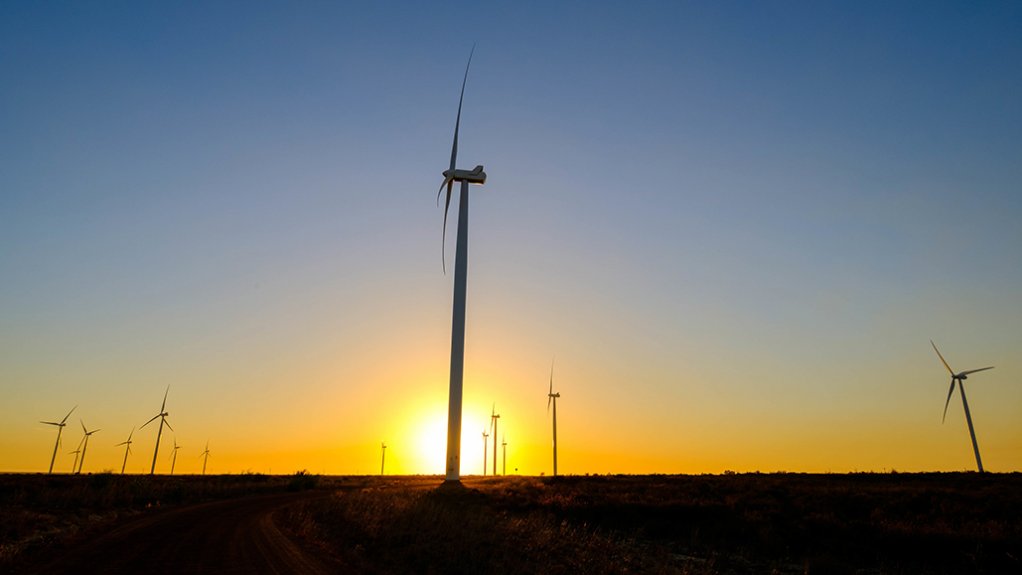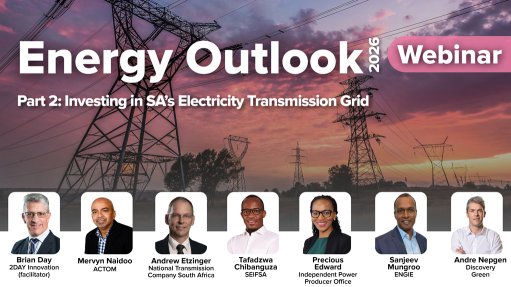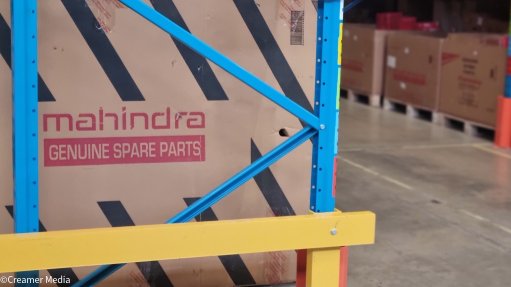International partners showcase South African JET projects in Mpumalanga
Denmark, France, Germany and the UK, which are all partner countries supporting South Africa's just energy transition (JET), have showcased a range of local, provincial and national projects and initiatives that are helping to drive the JET in Mpumalanga and the rest of South Africa.
Denmark has 50 years of experience transitioning from an energy system heavily reliant on coal to its current electricity system that is dominated by solar PV and wind power, said energy supply, distribution and consumption organisation Danish Energy Agency deputy director-general Stine Rasmussen.
"We have two projects that we are working on with partner institutions in South Africa, both of which build on core Danish competencies in wind energy that are particularly relevant for Mpumalanga.
"The first project is to start Phase 4 of the Wind Atlas of South Africa, with a specific focus on Mpumalanga, Limpopo and North West," she said during the Mpumalanga JET Dialogue in eMalahleni, Mpumalanga, on October 9.
"The current Wind Atlas is based on data from outdated measuring masts that do not provide data of sufficient quality for investors and policy makers. This new fourth phase of the Wind Atlas of South Africa will provide high-quality data using modern and taller measuring masts in the province.
"The new wind resource data will be able to confirm whether the wind resources in the provinces are as good as is modelled and the existing data suggests. We believe so [that the wind resources are good]," she added.
Further, the second project Denmark was involved in was a soon-to-be-released study by the Independent Power Producer Office (IPPO), which the Danish Energy Agency assisted with and that analyses how the country can deploy renewable energy in a cost-effective manner, Rasmussen noted.
"The study explores the value of renewable-energy projects in Mpumalanga where grid capacity is quite good relative to renewable-energy projects in other areas that have lower grid capacity with better wind and solar resources. The study explores the trade-offs.
"It is important to underline that there are good wind resources in Mpumalanga and we believe this will be confirmed with the new data from the new Wind Atlas.
"The study by the Danish Energy Agency and the IPPO indicates that there may be good reason for using the existing grid in Mpumalanga for the deployment of more wind energy projects.
"We hope our projects will lead to many good renewable-energy projects that will benefit the people, the economy and the prosperity of Mpumalanga," she said.
Further, Denmark is carrying out other projects in Mpumalanga with various partners, one example of which is the Mpumalanga JET policy platform, which maps out not only where wind resources are, but also where the people, power plants, grid and roads are.
These are mapped out in several layers of the tool, which is available on the Mpumalanga Green Cluster Agency website for policy-makers and investors, highlighted Ambassador of Denmark to South Africa Elsebeth Søndergaard Krone.
The country also had a project that provided entrepreneurial training for youth in high schools, and another community engagement project had provided 300 households with off-grid solar PV power, in partnership with village leaders, France and New Zealand, she highlighted.
"Danish engagement is diverse and with many years of cooperation on energy matters since 2013, we are a long-term partner of South Africa," she said.
Meanwhile, the UK had also been part of the JET partnership with South Africa, alongside Denmark, the EU, France, Germany and the Netherlands, said British High Commissioner to South Africa Antony Phillipson.
"A particular focus for the UK is working with municipalities to understand the challenges of the JET and especially the just part of it. Job creation needs to be at the heart of the JET," he said.
"It is important to put interventions such as these alongside broader economic reform programmes, such as [structural reforms initiative] Operation Vulindlela and others, at the heart of the JET."
The UK and its agencies were working with municipalities and focused, in particular in Mpumalanga, on energy and water projects, he added.
"We are also working with small, medium-sized and microenterprises (SMMEs) as part of the broader work for job creation. We are identifying sectors that will be needed for future job creation and economic growth to allow the transition to be just," said Phillipson.
No one must be left behind as South Africa transitioned, he emphasised.
Further, the UK has been through its own version of a JET, having shut down its last coal-fired power station in the first week of October.
"Our economy was founded on coal, and delivering economic growth and creating jobs was key for the political support that a JET needs," Phillipson noted.
The UK Foreign, Commonwealth & Development Office (FCDO) focused on programmes to create jobs that were sustainable and would last beyond the closure of coal plants and financial subsidies, said UK South Africa JET project support leader Gail Warrander.
"According to the World Bank country climate diagnostic report for South Africa, there could be a net gain of one-million jobs if the JET is done well. We want to ensure that enough of these new jobs are in Mpumalanga," she said.
For example, the FCDO is funding due diligence studies for companies and investment houses that have not previously invested in Mpumalanga.
"We also identified the need for different types of money, not only funding from banks and venture capital firms. We are working on creating blended finances and providing first-loss funding from other development partners and organisations, which we hope to announce in due course," she noted.
Further, France is aiming to maximise the social outcomes of the JET by enabling concrete projects to emerge, including in Mpumalanga, said Ambassador of France to South Africa David Martinon.
"We are supporting the implementation of a JET funding platform that will be launched soon. We have confidence that the tool will bring developers and donors together," he said.
France and its agencies have also supported the establishment of a JET municipal forum that will help municipalities to prepare and implement their energy transitions.
"The aim is to ensure that all municipalities have a space to exchange best practices and experiences, and thereby better define their own strategies," he added.
Other projects supported by France include the JET labour centre, which the country has supported for three years. The centre engages workers and their representatives, and communities on the energy transition process. It also organises the exchange of experience, provides training for workers and supports social dialogue.
Another project France and its agencies are working on, named the Community Explorer tool, is to measure the impact of the JET on local employment and livelihoods.
"This tool was developed for Mpumalanga and shows the vulnerability of households in areas close to power stations. We piloted this at the province level. It serves as a tool for defining and planning economic diversification strategies in the context of a coal phase-out," Martinon said.
Meanwhile, one of the initiatives of the EU is a €63-million grant implemented with support from Germany and France that will focus on skills development and reskilling, as well as supporting startups; small, medium-sized and microenterprises; and entrepreneurs.
"We hope to roll this out before the end of the year," said Delegation of the EU to South Africa deputy head of mission Fulgencio Garrido Ruiz.
Additionally, Germany has two projects in the Mpumalanga region, one of which is focused on skills development and how to support the labour market.
"We know the transition from coal will take away jobs, but it will also provide opportunities in the renewable-energy sector," said German Embassy in Pretoria economic counsellor Sarah Zügel.
"In Germany, we had the same problem and the same issue. We were a coal-dependent country. Over the past 20 years, we have been building up renewable energy from near-zero to about 50% today, which impacted on the coal-dependent regions," she said.
"We also support research looking into how the labour market can be changed to incentivise new jobs and the new investments that will provide the jobs for these new skills."
The country also had a JET in South Africa project, which was implemented by German development agency GIZ, that mainly supported JET planning. This programme looked specifically at necessary financial aspects and what financial tools would be needed.
The JET in South Africa programme had provided training and support for 40 SMMEs in how they could transition and how they could support the transition. The small businesses could also receive incubation grants, meaning they would receive some support to start new projects, which was important during the development of new businesses, said Zügel.
Article Enquiry
Email Article
Save Article
Feedback
To advertise email advertising@creamermedia.co.za or click here
Comments
Press Office
Announcements
What's On
Subscribe to improve your user experience...
Option 1 (equivalent of R125 a month):
Receive a weekly copy of Creamer Media's Engineering News & Mining Weekly magazine
(print copy for those in South Africa and e-magazine for those outside of South Africa)
Receive daily email newsletters
Access to full search results
Access archive of magazine back copies
Access to Projects in Progress
Access to ONE Research Report of your choice in PDF format
Option 2 (equivalent of R375 a month):
All benefits from Option 1
PLUS
Access to Creamer Media's Research Channel Africa for ALL Research Reports, in PDF format, on various industrial and mining sectors
including Electricity; Water; Energy Transition; Hydrogen; Roads, Rail and Ports; Coal; Gold; Platinum; Battery Metals; etc.
Already a subscriber?
Forgotten your password?
Receive weekly copy of Creamer Media's Engineering News & Mining Weekly magazine (print copy for those in South Africa and e-magazine for those outside of South Africa)
➕
Recieve daily email newsletters
➕
Access to full search results
➕
Access archive of magazine back copies
➕
Access to Projects in Progress
➕
Access to ONE Research Report of your choice in PDF format
RESEARCH CHANNEL AFRICA
R4500 (equivalent of R375 a month)
SUBSCRIBEAll benefits from Option 1
➕
Access to Creamer Media's Research Channel Africa for ALL Research Reports on various industrial and mining sectors, in PDF format, including on:
Electricity
➕
Water
➕
Energy Transition
➕
Hydrogen
➕
Roads, Rail and Ports
➕
Coal
➕
Gold
➕
Platinum
➕
Battery Metals
➕
etc.
Receive all benefits from Option 1 or Option 2 delivered to numerous people at your company
➕
Multiple User names and Passwords for simultaneous log-ins
➕
Intranet integration access to all in your organisation





















